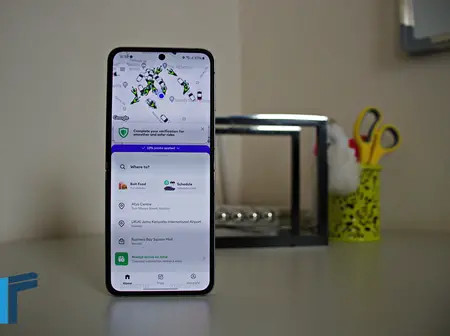Bolt is no longer just a ride-hailing app in Nairobi. Its parcel delivery arm, Bolt Send, is now preparing for a new leap into Mombasa and Kakamega. The company says the expansion is part of a broader bet on Kenya’s swelling e-commerce sector, where fast, reliable logistics can make or break a transaction.
Bolt Send has been live in Nairobi since its debut, tucked inside the familiar Bolt app that most users already rely on for daily rides. The model is simple: customers request a parcel delivery the same way they would a car, track the package in real time, and pay based on distance and demand. Drivers—vetted through Bolt’s platform—pick up and drop off the parcels door-to-door.
According to Dimmy Kanyankole, Bolt Kenya’s Country Manager, the service is headed for new ground. “Bolt Send services are currently available exclusively within Nairobi. However, we plan to launch within other cities such as Mombasa, Kakamega, etc, in phase two of our service expansion,” he said. Intercity deliveries may also be considered if uptake justifies the move.
Kenya’s parcel delivery landscape has never been short of players. Fargo Courier and G4S Courier have dominated the space for years, especially with corporate clients and cross-county routes. Recently, Fargo has leaned on tech-heavy features—same-day delivery, real-time tracking, digital booking systems—to keep pace with changing consumer expectations.
But Bolt isn’t chasing the same audience. Its pitch is directed at everyday users: the small boutique owner who needs a bag of dresses sent across town, the parent forwarding school documents, or the freelancer dispatching equipment on a tight schedule. By nesting delivery into an app already familiar to millions of Kenyans, Bolt is gambling on convenience as the winning card.
The strategy also reflects a subtle shift: ride-hailing platforms are no longer just about moving people. They’re positioning themselves as multi-service ecosystems—transport, food, and now, parcels—all running on the same infrastructure.
The selection of Mombasa and Kakamega isn’t random. Mombasa, Kenya’s second-largest city and a major port, has a growing middle class and a buzzing commercial scene that depends on fast logistics. E-commerce in the coastal region is climbing, helped by younger consumers who are quick to embrace app-based services.
Kakamega, by contrast, is more of a frontier. It’s a bustling western town with a lively trade culture and a growing appetite for digital services, but it hasn’t been a traditional target for major tech rollouts. For Bolt, entering Kakamega is both a risk and an opportunity: crack the logistics market there, and the company sets a precedent for similar urban centers often overlooked by larger delivery firms.
Kenya’s e-commerce market is projected to expand steadily in the coming years, powered by smartphone penetration and the near-ubiquity of mobile payments. Yet logistics remains one of the weakest links. Complaints about delayed deliveries, opaque tracking systems, or prohibitive costs are common.
Bolt’s pitch is to smooth over those gaps. By leveraging its existing driver-partner network, the company bypasses the need to build warehouses or fleets dedicated solely to logistics. It’s asset-light, app-driven, and consumer-facing—hallmarks of the gig economy model.
But the question lingers: can the same infrastructure that moves people efficiently also move parcels at scale? Especially once the company steps outside Nairobi, where traffic patterns, road quality, and delivery culture differ dramatically.
While Bolt builds on convenience, rivals like Fargo and G4S lean on scale and trust. These companies are entrenched in corporate logistics and long-distance deliveries, sectors where reliability and institutional contracts matter more than app interfaces. Fargo’s rollout of same-day services and real-time parcel tracking shows it’s not willing to surrender ground in the fast-delivery segment either.
There are also emerging challengers in the informal space. Motorcycle couriers—popularly known as boda-bodas—continue to dominate quick urban deliveries, especially for small packages. Many operate outside formal platforms but offer competitive prices and hyper-local knowledge. Bolt will need to demonstrate why its platform is worth paying for over a trusted neighborhood rider.
Bolt’s move into Mombasa and Kakamega raises several unanswered questions. Will consumers in smaller towns adopt app-based parcel services as quickly as those in Nairobi? Can Bolt scale deliveries without running into the same reliability problems that have dogged other gig-economy ventures? And how will established couriers respond once Bolt starts biting into their consumer base?
What’s clear is that the delivery market is shifting under the weight of Kenya’s digital economy. With more people shopping online, sending documents electronically, and expecting instant service, parcel delivery is no longer an auxiliary business—it’s becoming central to how commerce functions. Bolt’s expansion is both a test and a statement: the last mile is up for grabs.
Bolt Send’s entry into Mombasa and Kakamega will be watched closely, not just by competitors but by consumers eager for alternatives. The service has the advantage of convenience, app familiarity, and an existing driver network. But success outside Nairobi will depend on more than those strengths. It will hinge on how Bolt adapts to local delivery cultures, navigates competition from both formal couriers and boda-bodas, and builds trust in towns where brand loyalty is still up for negotiation.
For now, Bolt has set the stage for a broader battle over the everyday parcel—one that could redefine last-mile logistics in Kenya’s digital era.

Leave a Reply